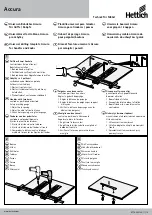
17
PLACING TOOL IN SERVICE
LUBRICATION
Protec Engine Oil
Always use an air line lubricator with these tools. We
rec om mend the following Lubricator–
Unit and Lubricant:
In Line Lubricator: CPN: 35371111
Lubricant: Protec Engine Oil CPN: 85448405
Attach the lubricator as close to the tool as prac ti cal.
After each two or three hours of operation and at the be-
gin ning of each work shift, if an air line lu bri ca tor is not
used, disconnect the air hose and pour about 3 cc of oil into
the air inlet of the tool.
Before storing the tool or if the tool is to be idle for a period
exceeding twenty-four hours, pour about 3 cc of oil into the
air inlet and operate the tool for 5 sec onds to coat the in ter-
nal parts with oil.
INSTALLATION
Air Supply and Connections
Always use clean, dry lubricated air. Dust, corrosive fumes
and/or excessive moisture can ruin the motor of an air tool.
An air line fi lter can greatly increase the life of an air tool.
The fi lter removes dust and moisture.
Make sure all hoses and fi ttings are the correct size and
are tightly secured. See diagram PP1 for a typ i cal piping
ar range ment.
The tool is shipped from the factory with 3/4” NPT male inlet
thread and quick release coupling.
OPERATION
Accessory Installation
Always turn off the air supply and disconnect the air
supply hose before installing, re mov ing or ad just ing
any accessory on this tool or before performing any
maintenance on this tool. Failure to do so could result
in injury.
For Latch Type Retainer
1. Operate the Latch until it is approximately 90 de grees
to the body of the tool and clicks into po si tion.
2. Insert the accessory into the tool until the collar of the
accessory is past the Latch.
3. Operate the Latch until it is parallel to the tool and it
clicks into position.
15 – 20 kg (30 – 40 lbs) is the recommended amount of down-
force to apply to the tool when working.
The amount of downforce is correct when the tool hits rhyth-
mi cal ly, is comfortable to hold and works effi ciently.
Do not repair the tool at the work site. Always take
the tool to a repair shop. Never drag the tool on the
ground. The air port and other openings will become clogged
with dirt and debris.
Compressed air is dangerous. When blowing the line clear
of dirt, wear eye protection and keep the air line directed
to ward a safe, clear area.
Always blow out the air line before using to clear the line
of dirt.
Do not operate the tool unless the chisel is against
the work since this will cause premature wear of
parts and reduce the vibration isolation properties
of the tool.
Always break material to the point of “give.” Crack ing does not
result in a complete break. Clear away rubble as it is broken
since uncleared rubble blocks the point of “give.”
Always take the right size “bite” with the tool. When work ing
new material, experiment to fi nd the right size “bite” re quired
for breaking that material ef fi cient ly.
If “bites” are too big, the operator will try to pry with
the tool. This could break the chisel. The tool is de-
signed for demolition, not pry ing. Always use a pick
for prying. If “bites” are to small, the operator will be
working too slow ly.
If the chisel or accessory should become stuck, do not use
excessive force or mechanical means on the tool to pull out
the chisel. Doing so will damage the vibration isolation unit.
Break out the stuck chisel with a spare chisel or tool.
Diagram PP1
WARNING
NOTICE
CAUTION
CAUTION
NOTICE
GB
Summary of Contents for IR30BS
Page 55: ...55 ...
















































